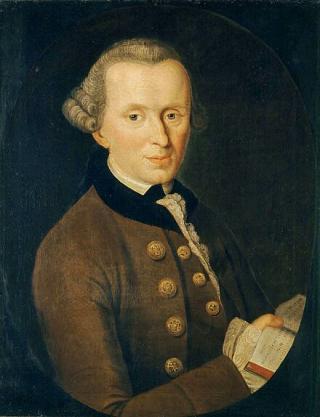Immanuel Kant
-
Course Schedule
Immanuel Kant (Week 7,8 and 9)
Immanuel Kant, a towering figure in the history of Western philosophy and a central figure of the Enlightenment, was born on April 22, 1724, in Königsberg, Prussia (now Kaliningrad, Russia). Kant's philosophical works profoundly influenced subsequent generations of thinkers and continue to shape debates in epistemology, metaphysics, ethics, and political philosophy.
Early Life and Education
Immanuel Kant was the fourth of nine children born to Johann Georg Kant, a harness maker, and Anna Regina Kant. His upbringing was modest, and his family belonged to the Pietist movement within the Lutheran Church, which emphasized religious devotion, moral integrity, and personal piety. Kant received his early education at the Pietist school of St. George's Hospital, where he excelled in Latin, Greek, and religious studies.
In 1740, Kant enrolled at the University of Königsberg (Albertina University), where he studied philosophy, mathematics, physics, and theology. He was deeply influenced by the works of Christian Wolff and Gottfried Wilhelm Leibniz, as well as by British empiricists such as John Locke and David Hume. Kant's philosophical development was shaped by his exposure to rationalism, empiricism, and the scientific advances of his time.
Academic Career and Intellectual Development
After completing his studies, Kant worked for several years as a private tutor to support himself financially. In 1755, he began lecturing at the University of Königsberg as a Privatdozent (unsalaried lecturer), and in 1770, he was appointed to the chair of logic and metaphysics at the university, where he remained for the rest of his academic career.
Kant's early writings, including "Universal Natural History and Theory of the Heavens" (1755) and "New Doctrine of Motion and Rest" (1758), focused on scientific inquiry and metaphysical speculation. However, it was his critical turn in the 1780s that would revolutionize modern philosophy.
The Critical Philosophy
Kant's most significant contribution to philosophy is his "Critical Philosophy," articulated in his major works "Critique of Pure Reason" (1781), "Critique of Practical Reason" (1788), and "Critique of Judgment" (1790). The "Critique of Pure Reason" is perhaps his most famous work, in which he seeks to establish the limits and conditions of human knowledge.
Critique of Pure Reason
Published in 1781, the "Critique of Pure Reason" is Kant's attempt to reconcile empiricism and rationalism while addressing the limits of human understanding. Kant distinguishes between phenomena (things as they appear to us) and noumena (things as they are in themselves), arguing that while we can know phenomena through sensory experience and the categories of understanding, we can never directly access the noumenal realm. Kant's critique challenges traditional metaphysical assumptions and establishes the role of a priori concepts (such as space, time, and causality) in structuring human experience.
Critique of Practical Reason
In the "Critique of Practical Reason" (1788), Kant turns his attention to ethics and moral philosophy. Here, he develops his theory of the categorical imperative, a moral law that commands rational agents to act according to principles that could be universally adopted without contradiction. Kant argues that moral principles are grounded in reason and autonomy, providing a foundation for ethical decision-making that transcends individual desires and circumstances.
Critique of Judgment
The "Critique of Judgment" (1790) completes Kant's critical system by addressing aesthetics and teleology. Kant explores the nature of beauty, the experience of the sublime, and the concept of purposiveness in nature. He argues that aesthetic judgments are based on subjective feelings of pleasure or displeasure but also possess a universal validity that reflects the harmony between subjective experience and objective principles.
Influence and Legacy
Kant's philosophy had a profound impact on subsequent developments in philosophy, including German idealism, existentialism, and analytic philosophy. His emphasis on the autonomy of reason, the limits of human knowledge, and the moral imperative of duty continues to shape debates in epistemology, ethics, political philosophy, and aesthetics.
Personal Life and Character
Immanuel Kant lived a disciplined and regimented life focused on his scholarly pursuits. He was known for his punctuality, routine, and dedication to his teaching and writing. Kant never married and led a solitary existence, devoting himself entirely to his intellectual endeavors and the pursuit of philosophical truth.
Later Years and Death
In his later years, Kant continued to write and publish essays on a wide range of topics, including religion, history, anthropology, and education. He remained active in the academic community of Königsberg until his death.
Immanuel Kant died on February 12, 1804, at the age of 79, in Königsberg, Prussia. His legacy as one of the greatest philosophers of the Enlightenment era endures, and his ideas continue to be studied, debated, and celebrated for their profound impact on the trajectory of Western thought.

Registration Form: Open Art Studio (Kids) Rumble Art Studio Minor Enrollment Form 2023.docx, 9KB ∞


